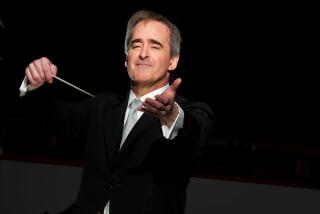Forgotten L.A. Composer Worked in Grand Scale
WASHINGTON — She was one of the few American female composers to gain national prominence in the first half of the century, and for years--until the 1970s--Los Angeles native Elinor Remick Warren’s choral music made her one of the country’s most-performed female composers.
By the time she died in 1991, however, there was waning demand for the elaborate compositions that had won a broad listenership for her 200 published works.
But a recent resurgence of interest in forgotten American composers is bringing Warren’s music back into the spotlight. This weekend, her work will be the centerpiece of a celebration at the Library of Congress, timed to coincide with the 100th anniversary of the year she was born. A collection of Warren’s manuscripts, recordings and correspondence will be formally presented to the library and some of her major works will be performed in a series of concerts.
Warren had been composing for years when, in 1940, her music was brought to the national stage. That year, the Los Angeles Philharmonic performed her work “The Passing of King Arthur,” an event broadcast simultaneously across the country, garnering wide critical acclaim.
The “King Arthur” piece will be performed Sunday at the National Cathedral in Washington. Selections from another of Warren’s works, her 1965 Requiem, will be showcased in L.A. next month when the Los Angeles Master Chorale performs a tribute to some of that city’s influential composers. Warren’s “Carillon Theme,” which is chimed before concerts and during intermission to indicate when performances are about to begin, has been used at the Dorothy Chandler Pavilion since its opening.
Raised in the Lafayette Park area during the early 1900s, Warren began playing the piano at the age of 3. She created her first composition two years later, with her mother copying the notes as she picked them out on the piano. Warren began her formal music training shortly thereafter and published her first piece while still in high school.
After completing her freshman year at Mills College in Oakland, Warren, then 20, moved to New York to study with composer and accompanist Frank LaForge. During her five years there, she composed and published additional pieces and accompanied several well-known singers, including Metropolitan Opera contralto Margaret Matzenauer. Warren also recorded a series of piano solos for a New York record company and performed at New York’s Carnegie Hall and with the Los Angeles Philharmonic.
As most women of the era wrote art songs for the piano, Warren’s large-scale choral works, which included orchestral accompaniment, astonished publishers and critics, who did not believe a woman could write such “masculine” music. And though female composers were not as respected as their male counterparts, Warren refused to write under a pseudonym. After one publisher printed a piece under “E.R. Warren” to disguise her sex, Warren added a clause to her contracts requiring that her full name be used.
“She never really liked to associate herself with just being a woman composer,” said Virginia Borton, a friend and author of Warren’s biography. “She felt that music had no gender.”
After her first marriage in 1925 ended in divorce, she married film producer Z. Wayne Griffin in 1936. While her growing family took precedence over her work, Warren wrote each day in her house near Hancock Park. Though she often gathered her three children, and later her grandchildren, around the piano to sing, Warren’s composition room was off-limits when she was at work.
“She’d be in there for hours with her glasses on while we were running around the house,” said her grandson, Zachary Wayne Griffin III. Warren continued to write and revise her major works until the late 1970s, traveling to Paris when she was in her 60s to study with musical pedagogue Nadia Boulanger. Yet with the demise of radio orchestras, the increasing costs of performing large-scale pieces and changing musical tastes, the music world paid less and less attention to her work.
“Elinor wrote in the grand style,” said Lance Bowling, president of L.A.-based Cambria Master Recording, which has produced several CDs of her music. “She didn’t care about musical trends of the day. She never got derailed on avant-garde. She stuck to her [style] and she wrote sonorous choral symphonies without regard to how much it would cost for performance.”
Although she was shy about promoting her own work, Bowling convinced Warren, at the age of 86, to record a collection of her piano pieces. Subsequent CDs, including a recording of her Requiem set to be released next month by Cambria, are bringing Warren’s music to new audiences.
Several years ago, the Three Choirs Festival in England performed Warren’s revised and renamed “The Legend of King Arthur.” She is only the second American composer to be included in the festival.
Some of her other works include “Abraham in Egypt,” which tells the biblical story of Abraham, and “Singing Earth,” a setting of four Carl Sandburg poems.
“There’s a passion in it and a spiritual quality . . . a transcendent sense,” said Pamela Blevins, a member of the Los Angeles-based Elinor Remick Warren Society. “There’s nothing false and pretentious about it. It’s heartfelt music.’
More to Read
The biggest entertainment stories
Get our big stories about Hollywood, film, television, music, arts, culture and more right in your inbox as soon as they publish.
You may occasionally receive promotional content from the Los Angeles Times.










